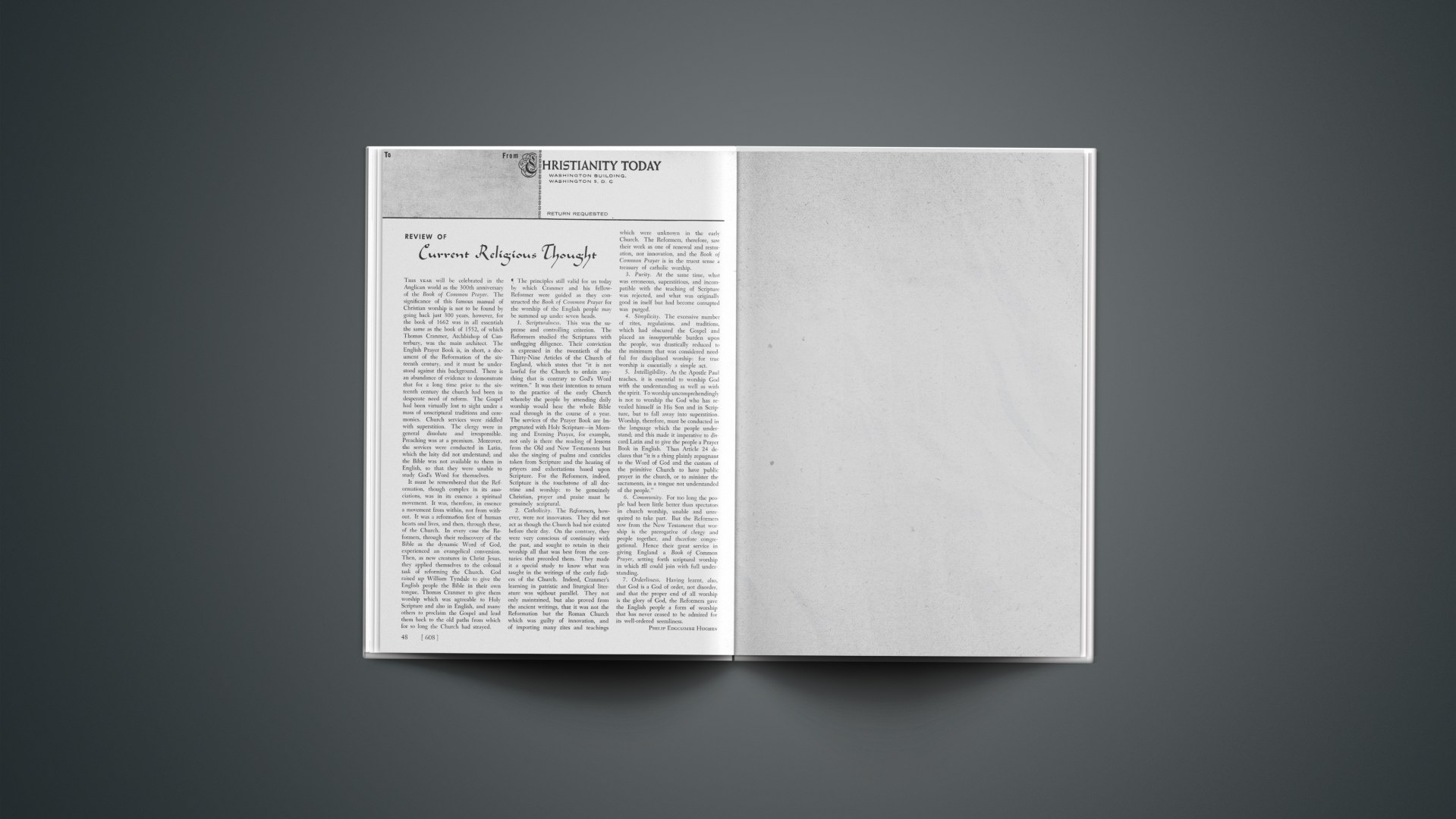This year will be celebrated in the Anglican world as the 300th anniversary of the Book of Common Prayer. The significance of this famous manual of Christian worship is not to be found by going back just 300 years, however, for the book of 1662 was in all essentials the same as the book of 1552, of which Thomas Cranmer, Archbishop of Canterbury, was the main architect. The English Prayer Book is, in short, a document of the Reformation of the sixteenth century, and it must be understood against this background. There is an abundance of evidence to demonstrate that for a long time prior to the sixteenth century the church had been in desperate need of reform. The Gospel had been virtually lost to sight under a mass of unscriptural traditions and ceremonies. Church services were riddled with superstition. The clergy were in general dissolute and irresponsible. Preaching was at a premium. Moreover, the services were conducted in Latin, which the laity did not understand; and the Bible was not available to them in English, so that they were unable to study God’s Word for themselves.
It must be remembered that the Reformation, though complex in its associations, was in its essence a spiritual movement. It was, therefore, in essence a movement from within, not from without. It was a reformation first of human hearts and lives, and then, through these, of the Church. In every case the Reformers, through their rediscovery of the Bible as the dynamic Word of God, experienced an evangelical conversion. Then, as new creatures in Christ Jesus, they applied themselves to the colossal task of reforming the Church. God raised up William Tyndale to give the English people the Bible in their own tongue, Thomas Cranmer to give them worship which was agreeable to Holy Scripture and also in English, and many others to proclaim the Gospel and lead them back to the old paths from which for so long the Church had strayed.
The principles still valid for us today by which Cranmer and his fellow-Reformer were guided as they constructed the Book of Common Prayer for the worship of the English people may be summed up under seven heads.
1. Scripturalness. This was the supreme and controlling criterion. The Reformers studied the Scriptures with unflagging diligence. Their conviction is expressed in the twentieth of the Thirty-Nine Articles of the Church of England, which states that “it is not lawful for the Church to ordain anything that is contrary to God’s Word written.” It was their intention to return to the practice of the early Church whereby the people by attending daily worship would hear the whole Bible read through in the course of a year. The services of the Prayer Book are impregnated with Holy Scripture—in Morning and Evening Prayer, for example, not only is there the reading of lessons from the Old and New Testaments but also the singing of psalms and canticles taken from Scripture and the hearing of prayers and exhortations based upon Scripture. For the Reformers, indeed, Scripture is the touchstone of all doctrine and worship: to be genuinely Christian, prayer and. praise must be genuinely scriptural.
2. Catholicity. The Reformers, however, were not innovators. They did not act as though the. Church had not existed before their day. On the contrary, they were very conscious of continuity with the past, and sought to retain in their worship all that was best from the centuries that preceded them. They made it a special study to know what was taught in the writings of the early fathers of the Church. Indeed, Cranmer’s learning in patristic and liturgical literature was without parallel. They not only maintained, but also proved from the ancient writings, that it was not the Reformation but the Roman Church which was guilty of innovation, and of importing many rites and teachings which were unknown in the early Church. The Reformers, therefore, saw their work as one of renewal and restoration, not innovation, and the Book of Common Prayer is in the truest sense a treasury of catholic worship.
3. Purity. At the same time, what was erroneous, superstitious, and incompatible with the teaching of Scripture was rejected, and what was originally good in itself but had become corrupted was purged.
4. Simplicity. The excessive number of rites, regulations, and traditions, which had obscured the Gospel and placed an insupportable burden upon the people, was drastically reduced to the minimum that was considered needful for disciplined worship: for true worship is essentially a simple act.
5. Intelligibility. As the Apostle Paul teaches, it is essential to worship God with the understanding as well as with the spirit. To worship uncomprehendingly is not to worship the God who has revealed himself in His Son and in Scripture, but to fall away into superstition. Worship, therefore, must be conducted in the language which the people understand; and this made it imperative to discard Latin and to give the people a Prayer Book in English. Thus Article 24 declares that “it is a thing plainly repugnant to the Word of God and the custom of the primitive Church to have public prayer in the church, or to minister the sacraments, in a tongue not understanded of the people.”
6. Community. For too long the people had been little better than spectators in church worship, unable and unrequired to take part. But the Reformers saw from the New Testament that worship is the prerogative of clergy and people together, and therefore congregational. Hence their great service in giving England a Book of Common Prayer, setting forth scriptural worship in which all could join with full understanding.
7. Orderliness. Having learnt, also, that God is a God of order, not disorder, and that the proper end of all worship is the glory of God, the Reformers gave the English people a form of worship that has never ceased to be admired for its well-ordered seemliness.










